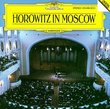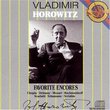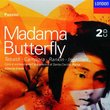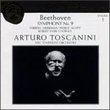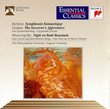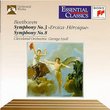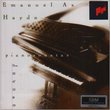| All Artists: Robert Schumann, Sergey Rachmaninov, Franz Liszt, Frederic Chopin, Claude Debussy, Moritz Moszkowski, Recorded Sound, Vladimir Horowitz Title: Horowitz Rediscovered Members Wishing: 0 Total Copies: 0 Label: RCA Original Release Date: 1/1/1975 Re-Release Date: 5/6/2003 Album Type: Original recording remastered Genres: Dance & Electronic, Special Interest, Classical Styles: Chamber Music, Forms & Genres, Concertos, Sonatas, Suites, Historical Periods, Classical (c.1770-1830), Modern, 20th, & 21st Century, Romantic (c.1820-1910), Instruments, Keyboard Number of Discs: 2 SwapaCD Credits: 2 UPC: 828765074926 |
Search - Robert Schumann, Sergey Rachmaninov, Franz Liszt :: Horowitz Rediscovered
 | Robert Schumann, Sergey Rachmaninov, Franz Liszt Horowitz Rediscovered Genres: Dance & Electronic, Special Interest, Classical
When Vladimir Horowitz was still alive, he insisted that his live performance recordings be corrected with retakes whenever he was dissatisfied with artistic or technical matters. This posthumous release is apparently the ... more » |
Larger Image |
CD DetailsSynopsis
Amazon.com When Vladimir Horowitz was still alive, he insisted that his live performance recordings be corrected with retakes whenever he was dissatisfied with artistic or technical matters. This posthumous release is apparently the first major label publication of an unedited Horowitz recital. Listeners who never heard Horowitz in concert, or who haven't heard any of the bootleg releases of his live performances, may be surprised to hear "The Pianist of the Century" actually hitting wrong notes and having out of control moments, just like a real live human being. But this complete recital, recorded in Carnegie Hall on November 16, 1975, presents a more honest and, in some ways, more affecting portrait of Horowitz than his more heavily edited recordings. The Etude-Tableau Op. 39, No. 5 may be a little messy, and Horowitz's way with the Chopin Scherzo is rather heavy-handed and sometimes veers off the track. But the Schumann works (often one of Horowitz's best composers) are quite splendid, well worth the reasonable cost of the set in themselves, and the encores all sparkle. The professional-quality recording has been expertly remastered. This may not be Horowitz's "best" recording, but it may be the truest representation of his playing. --Leslie Gerber Similarly Requested CDs
|
CD ReviewsHigh Voltage Pianism Hank Drake | Cleveland, OH United States | 05/30/2003 (4 out of 5 stars) "2003 marks the centennial year of the birth of Vladimir Horowitz. In commemoration, RCA has released the complete, unedited recital of November 16, 1975. None of the repertoire on this release is new to the Horowitz discography, but as the pianist never played the same works twice in the same way, the performances contain new insights. The first half of the recital featured two works by Schumann which were somewhat off the beaten path. The Blumenstück (Flower Piece) is played in a considerably different manner than his live performance from 1966. The tempo is dramatically slower, with more rubato as Horowitz occasionally slows down to smell the roses. The Sonata in F Minor, (sometimes referred to as the Concerto Without Orchestra) is a problematic piece. Horowitz's go-for-broke performance here is in marked contrast to the version he approved for release on LP in 1976 (and far superior to the botched CD "outtake" version on RCA 6680-2-RG). The pianist takes considerably more liberties in regard to tempo and rubato, and he takes a great number of risks technically (particularly in the second movement, which is very fast) which don't always pay off. That was the thing about Horowitz in concert: rather like a box of chocolates, you never knew what you were going to get. In the final analysis, the LP version (which is available on Phillips' Great Pianists of the Century) remains the benchmark performance of this piece. Rachmaninoff's G major Prelude is played with loving tenderness and astonishing control of the lower levels of dynamics. The two Rachmaninoff Etudes-Tableaux (one of them was an encore) are given spasmodic, occasionally brutal "go for broke" performances which teeter on the brink of disaster, but remain remarkable for all that. Liszt's Valse Oublieé and Au bord d'une source had been recorded by Horowitz before, but it's interesting just how much more effective these live performances are. Whether it's due to superior recorded sound, or perhaps because Horowitz was "in the mood" that day, the pianist perfectly captures the prismatic mystique of the forgotten waltz, and the bubbling brook of the water piece. Horowitz recorded more music by Chopin than any other composer. The A Minor Waltz (Horowitz's favorite) is played in a brooding, inward manner altogether different from his straightlaced 1971 studio version. The B minor Scherzo, a Horowitz staple, is given a feverish, slashing performance similar in tempo and mood to his 1951 recording, building to a stunning climax and concluding with interlocking octaves replacing the usual chromatic scales. The encores by Debussy, Schumann, Moszkowski and Rachmaninoff are a typical Horowitzian show (the pianist announces the encores, which he usually didn't do), and bring an effective close for the recital. To be frank, there are numerous unissued Horowitz performances in RCA's vaults (not to mention Sony's and Deutsche Grammophon's) which are even more deserving of release than this one. They include stunning live renditions of Balakirev's Islamey and Liszt's St. Francis Walking on the Water, alongside studio renditions of the Bach-Busoni Toccata in C and numerous shorter works. Nevertheless, this release is an important document as it is the first time a complete, unedited Horowitz recital has been released by a major label. Despite its imperfections, it should be in every serious music lover's CD collection. The sound is a bit close for comfort but acceptable." Primarily for Horowitz fans brtherjohn | Orange County, CA | 06/09/2003 (4 out of 5 stars) "I can add only a little to an earlier review of this concert - which was right on the money. But for those that might be looking for the earlier lp issue of the Schumann sonata, one can now obtain the original lp issue of the sonata on the Philips' Great Pianist series where that performance in question has finally been reissued on CD. (This should not be confused with the RCA Horowitz plays Schumann disc, where an alternate, inferior, take was used.) It is a matter of fact that both Sony and BMG has volumes of complete Horowitz recitals in their vaults. Having several boots of his concerts from the 70's, RCA did not always issue the better takes. (Or for tha matter, why didn't RCA issue VH's rarely performed Scriabin Nocturne for the left hand, which he played in '79?) As far as this recital goes, it's a bit of a mixed bag, but it is true that he never played the same piece twice the same way. Horowitz fans will jump on this set - yet at the same time crave more recitals to be issued! Sony and BMG: Are you listening?" He does what he does! Richard Steiger | Murray, KY USA | 12/27/2003 (5 out of 5 stars) "While listening to this recital I kept thinking of a comment a friend made after attending a Horowitz recital (possibly this very one). I called him and naively asked if it was a good recital. He informed me that Horowitz's playing has nothing whatever to do with good or bad. He is just Horowitz. He does what he does. If you don't like it, don't go!
That's pretty much the way I feel about this recital. There's certainly plenty to grumble about. The Blumenstuck is anything but semplice, and the last movement of the Schumann sonata seems to entirely confuse Horowitz, as he throws in everything but the kitchen sink in an unsuccessful attempt to make sense of it. (For a far more coherent rendition, try Pollini's stunning performance on DGG.) "Traumerie" is also pulled to pieces with all sorts of phony inner voices and changes of tempo. Worst of all is the poor Chopin Waltz, where Horowitz's tendency to set off little "bombs" in the left hand combines with endless fussing around with tempo and phrasing to produce a terminally annoying performance. So why the five stars? Because ultimately none of the above matters much. This is still Horowitz in hs late prime, complete, unedited, and quite well-recorded. The Rachmaninoff and Liszt works are superb, as are the Debussy and Moszkowski and the first three movements of the sonata. Love him or hate him, it's HOROWITZ LIVE this very night in your living room. Be there!" |

 Track Listings (6) - Disc #1
Track Listings (6) - Disc #1